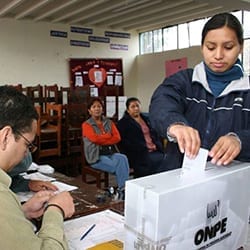On April 10, approximately 23 million Peruvians voted to elect their new president, congressmen and members of Parliament. These elections were extraordinary because in the history of Peru, there had not been four consecutive governments elected democratically. In the past, the numerous authoritarian governments imposed by force interrupted the Peruvian democracy for long periods of time.
In this last election, no single candidate for the presidency received a majority and consequently, there will be a second round of voting in June. The two candidates who received the highest number of votes will be included on the ballot: Keiko Fujimori and Pedro Pablo Kuczynski. Kuczynski, who finished in second place, will have to establish alliances with the centrist and leftist sectors he faced in the first part of the process.
Another special aspect of this election process involves actions taken by the National Elections Board (JNE), which is the entity responsible for election matters. In the weeks before the elections, the JNE had disqualified candidates for administrative reasons related to registration (i.e., the failure to satisfy formal requirements) and for prohibited political proselytism (providing gifts and money to voters). Thus, out of the original 19 presidential candidates registered, only nine remained in the race. Some candidates were disqualified by electoral authorities, while others left the race once they realized they would not be able to attain the number of votes needed to maintain their party registration. The decrease in the number of candidates was due to recent changes in the electoral law, which were approved after the elections were convened. According to the JNE’s interpretation, the changes were applicable for this election but only in certain cases.
These circumstances created various reactions — some radical — within society. Some sectors of the population claimed that the candidates’ political participation should have priority over the fulfillment of the formal requirements set forth in the amended law. Others approved strict compliance with the regulations and therefore backed the disqualification of candidates whose actions or registration process did not comply with the law. They contended that the law must be observed despite any circumstances. However, the decisions made by the JNE and the lower authorities were questioned because they were perceived to be inconsistent. The JNE disqualified some candidates that had low support among the populace and who failed to satisfy the new requirements. On the other hand, it allowed others who had greater voter support to remain in the race despite having various violations. One example is Keiko Fujimori, the daughter of former President Alberto Fujimori, who is serving a 25-year prison sentence for crimes including kidnaping and murder. Keiko Fujimori, who received 40 percent of the votes on April 10, engaged in prohibited political proselytism but was not penalized like other candidates who eventually had to leave the race. Other candidates and political parties who had greater influence among the elite also were not precluded from participating in the electoral process despite failing to meet the new requirements.
Thus, for several weeks prior to the popular vote, news media highlighted the uncertainty of the election process due to the delays in the electoral authorities’ official decisions, which were often revealed in the early morning hours or on holidays. In turn, the essential debate on presidential and parliamentary candidates’ ideas and claims was left in the background. Given the uncertainty of who would remain in the race, more attention was given to the importance of processing the final candidate registrations as opposed to candidates’ ideas and plans for the country. Debates over the country’s direction, economic policies, solutions to combat poverty, citizen insecurity and corruption were not held with the frequency or intensity needed to give voters complete information before electing a candidate. Consequently, the candidates who had been affected by the new law claimed that the electoral process was irreparably flawed — others even considered it fraudulent — while more moderate candidates believed the process should continue despite the problems and that necessary reforms to avoid similar disruptions in future elections should be pursued later. Fortunately for Peru and its people, the more extreme views did not succeed, and the process concluded uneventfully.
These foregoing events should alert Peruvians of the need to consolidate democratic institutions, maintain respect for electoral laws and eliminate possible cases of discrimination and inequality in their electoral process. Such a democratic process should always be transparent and balanced and allow a rigorous debate of ideas and proposals for more effective government. An important aspect of this electoral process was the participation of international observers from the Organization of American States (OAS) and the European Union, among others. Their contributions, as conveyed to the public, will allow for the impartial identification of aspects that should be corrected in order to improve the electoral system and facilitate mechanisms for the renewal of Peru’s democracy.
The second round of voting will take place in June. We anticipate no further mishaps or delays as we proceed to the election of a new national government, the fourth democratically elected without interruption by an authoritarian government imposed by force.
Porfirio Barrenechea is a 2011 Americas Project fellow from Peru.
